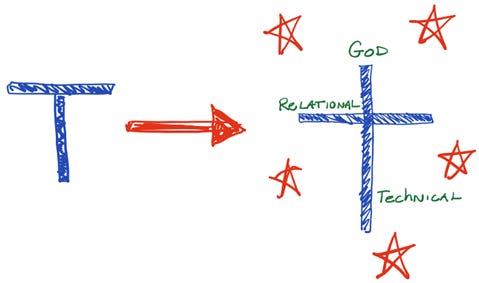A Missing Piece
My Personal Board of Directors
Post 8: My Personal Board of Directors
Some confessions here. First, I’m 52 years old. That feels quite old—until I say this next part: I still feel like I need mentorship.
At 52, I feel like I might have some wisdom. Something to say. A thought or two that might be worth listening to. And yet, I still need deep, anchoring relationships.
I didn’t fully realize this need until I was nearing 40. I knew my dad had been influential, but I hadn’t really appreciated it. I hadn’t named it. Then, over lunch with an older colleague, I was introduced to the concept of a “personal board of directors.” He said we all need people in our professional lives who listen, who care deeply about where we’re going, and who have the wisdom, gravitas, and courage to speak into our lives—especially when we’re headed in the wrong direction.
I’ve been lucky. You’ll meet several members of my Board of Directors across the pages of The t-Shaped Engineer in the Age of AI (you’ll have to get the book to meet them all!). But here, I want to introduce you to one: Ron Welch.
Ron Welch
Ron Welch is a leader’s leader. Vision in spades. Drive to match.
When he offered me my first academic position, it came with a caveat:
“I want you to go to the ASCE training for faculty advisors your first fall.”
I said, “OK, sounds good.”
Then he added, “It starts before your contract does—early August. You’ll need to get to Washington, D.C. to see it all. Your contract doesn’t start until late August. Is that a problem?”
And then, with a smile:
“Oh, by the way, our ASCE student chapter won’t just be good—it will be great. I’m counting on you.”
(Through the next half-dozen years, we were awarded Best Student Chapter in our region and were national finalists multiple times. No pressure indeed.)
He was hugely influential in my personal career, but you should know that he is hugely influential across engineering education in general. A former ASEE National Teacher of the Year. A key figure in the ASCE ExCEEd Teaching Workshop, which became a cornerstone of civil engineering education, training hundreds of professors and emphasizing:
Structured organization
Engaging presentation
Enthusiasm
Positive rapport
Frequent assessment
Appropriate use of technology
The Missing Piece
As I was developing the t-shaped engineer concept, I called Ron. I asked him about meaning and purpose within the ExCEEd model. He told me it was there. I gently said I thought it wasn’t.
He laughed and said, “Sure it is.”
It was a warm conversation.
We talked again a few weeks later.
“Mike—you’re right. It isn’t really there. It’s up to you. Do something about it. Make it happen. You can do it.”
That’s Ron. Warm, relational, decisive.
This post is relational in that it focuses on Ron, but it’s really trying to get at something deeper: the missing piece in many models of engineering education—including ExCEEd. That missing piece is God, meaning, and purpose.
Ron’s influence on my career was massive, and when we worked together we worked toward creating an environment at a secular institution that provided meaning and purpose. But there were two problems:
Even the best frameworks can fall short if they don’t address the deeper questions—and intentionally name them:
Why are we doing this?
Who are we becoming?
What does it mean to flourish?
Unless we keep God at the center—unless we “build our house on the rock”—the storms will come, the water will rise, and we will be in danger of being swept away.
Ron’s warmth, generosity, and wisdom were on full display in that conversation. It became one of the foundational moments in the creation of the t-shaped engineer model. And it reminded me that even the most structured systems need soul.
Reflection Questions
Who’s on your personal board of directors? Who speaks truth into your life?
Where have you encountered models or systems that lacked meaning or purpose?




Mentors all the way through are so important - thanks for sharing your father's advice!
HS English teacher here - about a decade ago, had a lightbulb/humility moment. All of us who teach or have taught The Great Gatsby teach or have taught a book built around advice from a father. Fitzgerald chose that frame, and so much of my approach to that book had been overshadowed by pressures to cover larger themes, or other writing style choices, or just other components.
But that book, reading it as a book about advice, seeing others, following the unspoken and spoken choices of people around you - same age, older age, younger age - came to mind reading this excellent post. Thank you.